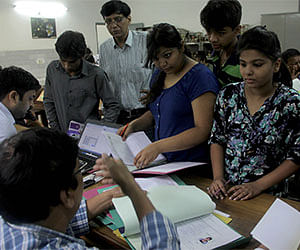
Delhi government today told the High Court that management quota for nursery admission in private schools was "inherently prone to misuse", which led it to step in and scrap it.
The submission was made in response to a query by a bench of Chief Justice G Rohini and Justice Jayant Nath as to how private unaided schools can be restrained from exercising management quota when they are entitled to it under a 2007 order of Lt Governor.
"When there is something inherently prone to misuse, state as regulator can say don''t do it. Management quota is a criterion which is prone to misuse," the Delhi government said on the issue.
The private unaided schools on the other hand contended that the Delhi government's January 6 order scrapping various criteria and the management quota was not issued by the LG or under any statute and "ran foul" of the LG''s 2007 order.
After hearing arguments of both sides, the bench reserved its verdict on the government's plea challenging a single judge order of the high court staying the scrapping of the management quota and certain other criteria for nursery admissions in private unaided schools.
While reserving its verdict, the court observed that due to shortage of good schools in Delhi, people were being forced to go to Noida where it was easier to get admission.
During the hearing, the court said the government would have to show that private unaided schools were indulging in commercialisation and profiteering by way of the management quota and asked "where is the basis for such allegation?"
The government said it has received complaints from lot of parents that some schools have demanded capitation fees and added that these were placed before the single-judge who in turn asked the government to take action.
It said it has issued show cause notices to some schools which had indulged in such activity.
The government also contended that the 2007 order was not etched in stone so as to make it insurmountable for all times to come.
It alleged that there were "inherent contradictions" in the entire approach of the single-judge who had passed the February 4 interim order in which he had also given a prima facie view that the January 6 decision was taken without any authority of law.
The submission was made in response to a query by a bench of Chief Justice G Rohini and Justice Jayant Nath as to how private unaided schools can be restrained from exercising management quota when they are entitled to it under a 2007 order of Lt Governor.
"When there is something inherently prone to misuse, state as regulator can say don''t do it. Management quota is a criterion which is prone to misuse," the Delhi government said on the issue.
The private unaided schools on the other hand contended that the Delhi government's January 6 order scrapping various criteria and the management quota was not issued by the LG or under any statute and "ran foul" of the LG''s 2007 order.
After hearing arguments of both sides, the bench reserved its verdict on the government's plea challenging a single judge order of the high court staying the scrapping of the management quota and certain other criteria for nursery admissions in private unaided schools.
While reserving its verdict, the court observed that due to shortage of good schools in Delhi, people were being forced to go to Noida where it was easier to get admission.
During the hearing, the court said the government would have to show that private unaided schools were indulging in commercialisation and profiteering by way of the management quota and asked "where is the basis for such allegation?"
The government said it has received complaints from lot of parents that some schools have demanded capitation fees and added that these were placed before the single-judge who in turn asked the government to take action.
It said it has issued show cause notices to some schools which had indulged in such activity.
The government also contended that the 2007 order was not etched in stone so as to make it insurmountable for all times to come.
It alleged that there were "inherent contradictions" in the entire approach of the single-judge who had passed the February 4 interim order in which he had also given a prima facie view that the January 6 decision was taken without any authority of law.









